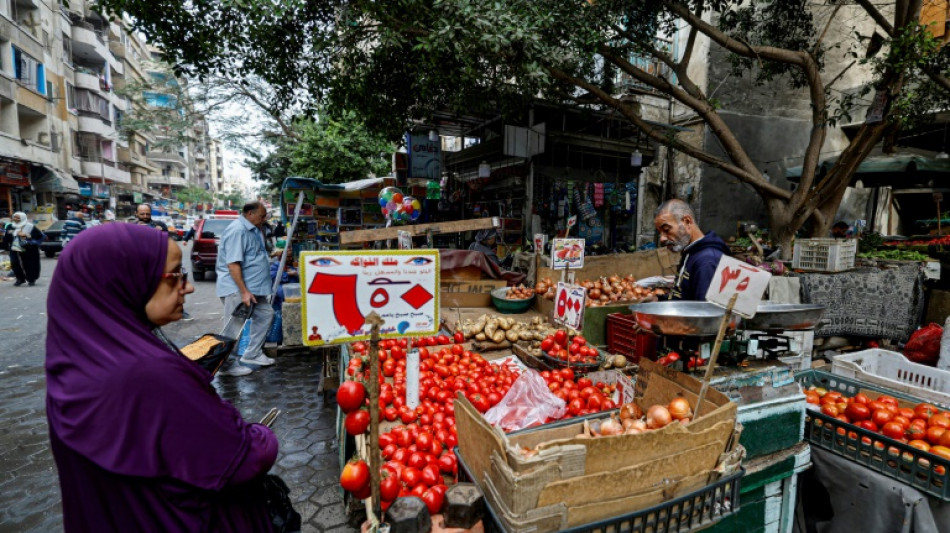
-
 Hong Kong political freedoms in spotlight during bumper trial week
Hong Kong political freedoms in spotlight during bumper trial week
-
Debt-saddled Laos struggles to tame rampant inflation

-
 Senna, Schumacher... Beganovic? Macau GP showcases future F1 stars
Senna, Schumacher... Beganovic? Macau GP showcases future F1 stars
-
India's vinyl revival finds its groove

-
 G20 tests Brazil's clout in Lula 3.0 era
G20 tests Brazil's clout in Lula 3.0 era
-
Over 20,000 displaced by gang violence in Haiti: UN agency

-
 Famed gymastics coach Bela Karolyi dies
Famed gymastics coach Bela Karolyi dies
-
'Break taboos': Josep Borrell wraps up time as EU's top diplomat

-
 Climate finance can be hard sell, says aide to banks and PMs
Climate finance can be hard sell, says aide to banks and PMs
-
Trump revives 'peace through strength,' but meaning up to debate

-
 New York auction records expected for a Magritte... and a banana
New York auction records expected for a Magritte... and a banana
-
Egypt's middle class cuts costs as IMF-backed reforms take hold

-
 Beirut businesses struggle to stay afloat under Israeli raids
Beirut businesses struggle to stay afloat under Israeli raids
-
Dupont lauds France 'pragmatism' in tight New Zealand win

-
 Swiatek leads Poland into maiden BJK Cup semi-final
Swiatek leads Poland into maiden BJK Cup semi-final
-
West Indies restore pride with high-scoring win over England

-
 Hull clings to one-shot lead over Korda, Zhang at LPGA Annika
Hull clings to one-shot lead over Korda, Zhang at LPGA Annika
-
Xi tells Biden ready for 'smooth transition' to Trump

-
 Trump nominates fracking magnate and climate skeptic as energy secretary
Trump nominates fracking magnate and climate skeptic as energy secretary
-
Tyson says 'no regrets' over loss for fighting 'one last time'

-
 Springboks' Erasmus hails 'special' Kolbe after England try double
Springboks' Erasmus hails 'special' Kolbe after England try double
-
France edge out New Zealand in Test thriller

-
 Netherlands into Nations League quarter-finals as Germany hit seven
Netherlands into Nations League quarter-finals as Germany hit seven
-
Venezuela to free 225 detained in post-election unrest: source

-
 Late Guirassy goal boosts Guinea in AFCON qualifying
Late Guirassy goal boosts Guinea in AFCON qualifying
-
Dominant Sinner cruises into ATP Finals title decider with Fritz

-
 Dinosaur skeleton fetches 6 million euros in Paris sale
Dinosaur skeleton fetches 6 million euros in Paris sale
-
Netherlands-Hungary Nations League match interrupted by medical emergency

-
 Kolbe at the double as South Africa condemn England to fresh defeat
Kolbe at the double as South Africa condemn England to fresh defeat
-
Kolbe at the double as South Africa beat England 29-20

-
 'If I don't feel ready, I won't play singles,' says Nadal ahead of Davis Cup farewell
'If I don't feel ready, I won't play singles,' says Nadal ahead of Davis Cup farewell
-
Fifth of dengue cases due to climate change: researchers

-
 Trump's Republican allies tread lightly on Paris pact at COP29
Trump's Republican allies tread lightly on Paris pact at COP29
-
Protesters hold pro-Palestinian march in Rio ahead of G20

-
 Graham equals record as nine-try Scotland see off dogged Portugal
Graham equals record as nine-try Scotland see off dogged Portugal
-
China's Xi urges APEC unity in face of 'protectionism'

-
 Japan's Kagiyama, Yoshida sweep gold in Finland GP
Japan's Kagiyama, Yoshida sweep gold in Finland GP
-
Macron to press Milei on climate action, multilateralism in Argentina talks

-
 Fritz battles past Zverev to reach ATP Finals title decider
Fritz battles past Zverev to reach ATP Finals title decider
-
Xi, Biden to meet as Trump return looms

-
 Kane warns England must protect team culture under new boss
Kane warns England must protect team culture under new boss
-
Italy beat Japan to reach BJK Cup semi-finals

-
 Farmers target PM Starmer in protest against new UK tax rules
Farmers target PM Starmer in protest against new UK tax rules
-
Italy's Donnarumma thankful for Mbappe absence in France showdown

-
 McIlroy in three-way tie for Dubai lead
McIlroy in three-way tie for Dubai lead
-
Bagnaia wins Barcelona MotoGP sprint to take season to final race

-
 Shiffrin wins Levi slalom for 98th World Cup victory
Shiffrin wins Levi slalom for 98th World Cup victory
-
Israel pummels south Beirut as Lebanon mulls truce plan

-
 Religious Jews comfort hostages' families in Tel Aviv
Religious Jews comfort hostages' families in Tel Aviv
-
German Greens' Robert Habeck to lead bruised party into elections


Egypt's middle class cuts costs as IMF-backed reforms take hold
Egypt's economy has been in crisis for years, but as the latest round of International Monetary Fund-backed reforms bites, much of the country's middle class has found itself struggling to afford goods once considered basics.
The world lender has long backed measures in Egypt including a liberal currency exchange market and weaning the public away from subsidies.
On the ground, that has translated into an eroding middle class with depleted purchasing power, turning into luxuries what were once considered necessities.
Nourhan Khaled, a 27-year-old private sector employee, has given up "perfumes and chocolates".
"All my salary goes to transport and food," she said as she perused items at a west Cairo supermarket, deciding what could stay and what needed to go.
For some, this has extended to cutting back on even the most basic goods -- such as milk.
"We do not buy sweets anymore and we've cut down on milk," said Zeinab Gamal, a 28-year-old housewife.
Most recently, Egypt hiked fuel prices by 17.5 percent last month, marking the third increase just this year.
The measures are among the conditions for an $8 billion IMF loan programme, expanded this year from an initial $3 billion to address a severe economic crisis in the North African country.
- Mounting pressures -
"The lifestyle I grew up with has completely changed," said Manar, a 38-year-old mother of two, who did not wish to give her full name.
She has taken on a part-time teaching job to increase her family's income to 15,000 Egyptian pounds ($304), just so she can "afford luxuries like sports activities for their children".
Her family has even trimmed their budget for meat, reducing their consumption from four times to "only two times per week".
Egypt, the Arab world's most populous country, is facing one of its worst economic crises ever.
Foreign debt quadrupled since 2015 to register $160.6 billion in the first quarter of 2024. Much of the debt is the result of financing for large-scale projects, including a new capital east of Cairo.
The war in Gaza has also worsened the country's economic situation.
Repeated attacks on Red Sea shipping by Yemen's Huthi rebels in solidarity with Palestinians in Gaza have resulted in Egypt's vital Suez Canal -- a key source of foreign currency -- losing over 70 percent of its revenue this year.
Amid growing public frustration, officials have recently signalled a potential re-evaluation of the IMF programme.
"If these challenges will make us put unbearable pressure on public opinion, then the situation must be reviewed with the IMF," President Abdel Fattah al-Sisi said last month.
Prime Minister Mostafa Madbouly also ruled out any new financial burdens on Egyptians "in the coming period", without specifying a timeframe.
Economists, however, say the reforms are already taking a toll.
Wael Gamal, director of the social justice unit at the Egyptian Initiative for Personal Rights, said they led to "a significant erosion in people's living conditions" as prices of medicine, services and transportation soared.
He believes the IMF programme could be implemented "over a longer period and in a more gradual manner".
- 'Bitter pill to swallow' -
Egypt has been here before. In 2016, a three-year $12-billion loan programme brought sweeping reforms, kicking off the first of a series of currency devaluations that have decimated the Egyptian pound's value over the years.
Egypt's poverty rate stood at 29.7 percent in 2020, down slightly from 32.5 percent the previous year in 2019, according to the latest statistics by the country's CAPMAS agency.
But Gamal said the current IMF-backed reforms have had a "more intense" effect on people.
"Two years ago, we had no trouble affording basics," said Manar.
"Now, I think twice before buying essentials like food and clothing," she added.
Earlier this month, the IMF's managing director Kristalina Georgieva touted the programme's long-term impact, saying Egyptians "will see the benefits of these reforms in a more dynamic, more prosperous Egyptian economy".
Her remarks came as the IMF began a delayed review of its loan programme, which could unlock $1.2 billion in new financing for Egypt.
Economist and capital market specialist Wael El-Nahas described the loan as a "bitter pill to swallow", but called it "a crucial tool" forcing the government to make "systematic" decisions.
Still, many remain sceptical.
"The government's promises have never proven true," Manar said.
Egyptian expatriates send about $30 billion in remittances per year, a major source of foreign currency.
Manar relies on her brother abroad for essentials, including instant coffee which now costs 400 Egyptian pounds (about $8) per jar.
"All I can think about now is what we will do if there are more price increases in the future," she said.
A.S.Diogo--PC




